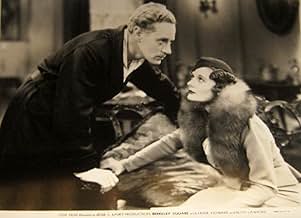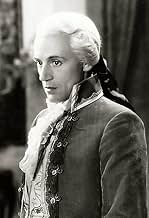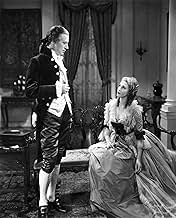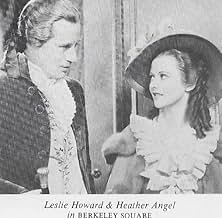A young American man comes to believe that he can will himself back to London in the time of the American Revolution and meet his ancestors, who lived in the house he has just inherited.A young American man comes to believe that he can will himself back to London in the time of the American Revolution and meet his ancestors, who lived in the house he has just inherited.A young American man comes to believe that he can will himself back to London in the time of the American Revolution and meet his ancestors, who lived in the house he has just inherited.
- Nominated for 1 Oscar
- 4 wins & 2 nominations total
Samuel S. Hinds
- The American Ambassador
- (as Samuel Hinds)
Lionel Belmore
- Innkeeper
- (uncredited)
Tom Ricketts
- Town Crier
- (uncredited)
Hylda Tyson
- Maid
- (uncredited)
Featured review
In adapting his own stage play 'Berkeley Square' for the screen, playwright John L Balderston made numerous changes. One change is significant in hindsight: during Act One of the stage play, the dialogue makes several references to a war hero named Bill Clinton! (A hero on the side fighting AGAINST the United States.) In the film, this British officer is merely identified as Major Clinton, and there are no mentions of his heroics.
Leslie Howard, everyone's definitive Englishman, was actually English only by a fluke: his parents were Hungarian Jews who moved to London shortly before his birth. In the film version of 'Berkeley Square', Howard portrays two Americans -- one from the 18th century, one from the present -- but his accent and demeanour in both roles are quintessentially English. Howard had previously starred on Broadway in this story, but in the stage play he portrayed only the modern-day Peter Standish who journeys into the past; his namesake ancestor (swapping places with him in the present) remained offstage.
Here we have the fantasy about a modern American who contrives to switch places in time with his 18th-century ancestor: both men are named Peter Standish, and are physically identical. (This is unlikely: the medical, dental and nutritional standards in 1784 would have kept that century's Standish looking very different from his descendant.) Apart from failing to convince me that he's American, Howard gives an excellent performance in both roles. Soon enough, Peter Standish acquires a touch of Peter Ibbetson as he falls in love with a woman who will die in 1787, more than a century before his own birth.
The ever-reliable Samuel S. Hinds (wearing a bizarre moustache here) plays straight man to Howard in one fascinating scene, in which Standish explains the difference between linear time and non-linear time: in the latter, all the events in the universe are occurring simultaneously.
Also quite excellent is Betty Lawford in an unsympathetic role. She wears some very chic gloves but also sports a bizarre fur collar that seems to be intended for a female impersonator. A transvestite linebacker could hide his shoulders inside there!
As the doomed young lady of 18th-century England, Heather Angel has one memorable scene opposite the 18th-century Standish's body possessed by his modern descendant. Staring into Standish's eyes, she glimpses an amazing stock-footage montage of the chaos and mayhem of modern times. Her reaction is memorable.
A story like this will have intentional anachronisms, but I looked for unintentional errors. Here's one: a string ensemble in 1784 perform Gossec's 'Gavotte' two years before he wrote it. Have another: in the opening scene, set in September 1784, Lionel Belmore reports that a French aeronaut has just flown from Dover to Calais (Belmore mispronounces this name) in a balloon. Actually, that didn't happen until January 1785: the flight was in the opposite direction, and there were two men (one of them Anglo-American) in the balloon. In a later scene, some English gentlemen give the word 'bathed' the wrong pronunciation (yes, I'm quite certain). The art direction is generally excellent, except for a dodgy thunderstorm. And it's weird to encounter the term 'crux ansata' applied to what modern viewers know better as the Egyptian ankh.
This film gets very much right a detail that many other period stories get wrong: 'Berkeley Square' acknowledges that the past is a dirtier, not cleaner, place than the present.
The single worst thing about 'Berkeley Square' is the overscored soundtrack: practically every scene assaults the ears with loud background music, when so much of this gentle fantasy would have worked better with no music at all. I was delighted that the character actress Beryl Mercer is much less annoying than usual here, probably because (for once) she's been given no maudlin material. My rating for this gentle, stately fantasy is 7 out of 10. For a much more romantic treatment of this premise with a different set of time-travel paradoxes, I recommend a better movie: 'Somewhere in Time'.
Leslie Howard, everyone's definitive Englishman, was actually English only by a fluke: his parents were Hungarian Jews who moved to London shortly before his birth. In the film version of 'Berkeley Square', Howard portrays two Americans -- one from the 18th century, one from the present -- but his accent and demeanour in both roles are quintessentially English. Howard had previously starred on Broadway in this story, but in the stage play he portrayed only the modern-day Peter Standish who journeys into the past; his namesake ancestor (swapping places with him in the present) remained offstage.
Here we have the fantasy about a modern American who contrives to switch places in time with his 18th-century ancestor: both men are named Peter Standish, and are physically identical. (This is unlikely: the medical, dental and nutritional standards in 1784 would have kept that century's Standish looking very different from his descendant.) Apart from failing to convince me that he's American, Howard gives an excellent performance in both roles. Soon enough, Peter Standish acquires a touch of Peter Ibbetson as he falls in love with a woman who will die in 1787, more than a century before his own birth.
The ever-reliable Samuel S. Hinds (wearing a bizarre moustache here) plays straight man to Howard in one fascinating scene, in which Standish explains the difference between linear time and non-linear time: in the latter, all the events in the universe are occurring simultaneously.
Also quite excellent is Betty Lawford in an unsympathetic role. She wears some very chic gloves but also sports a bizarre fur collar that seems to be intended for a female impersonator. A transvestite linebacker could hide his shoulders inside there!
As the doomed young lady of 18th-century England, Heather Angel has one memorable scene opposite the 18th-century Standish's body possessed by his modern descendant. Staring into Standish's eyes, she glimpses an amazing stock-footage montage of the chaos and mayhem of modern times. Her reaction is memorable.
A story like this will have intentional anachronisms, but I looked for unintentional errors. Here's one: a string ensemble in 1784 perform Gossec's 'Gavotte' two years before he wrote it. Have another: in the opening scene, set in September 1784, Lionel Belmore reports that a French aeronaut has just flown from Dover to Calais (Belmore mispronounces this name) in a balloon. Actually, that didn't happen until January 1785: the flight was in the opposite direction, and there were two men (one of them Anglo-American) in the balloon. In a later scene, some English gentlemen give the word 'bathed' the wrong pronunciation (yes, I'm quite certain). The art direction is generally excellent, except for a dodgy thunderstorm. And it's weird to encounter the term 'crux ansata' applied to what modern viewers know better as the Egyptian ankh.
This film gets very much right a detail that many other period stories get wrong: 'Berkeley Square' acknowledges that the past is a dirtier, not cleaner, place than the present.
The single worst thing about 'Berkeley Square' is the overscored soundtrack: practically every scene assaults the ears with loud background music, when so much of this gentle fantasy would have worked better with no music at all. I was delighted that the character actress Beryl Mercer is much less annoying than usual here, probably because (for once) she's been given no maudlin material. My rating for this gentle, stately fantasy is 7 out of 10. For a much more romantic treatment of this premise with a different set of time-travel paradoxes, I recommend a better movie: 'Somewhere in Time'.
- F Gwynplaine MacIntyre
- Dec 28, 2007
- Permalink
Storyline
Did you know
- TriviaS.T. Joshi points to this film as an inspiration for H.P. Lovecraft's novel "The Shadow Out of Time": "Lovecraft saw this film four times in late 1933; its portrayal of a man of the 20th century who somehow merges his personality with that of his 18th-century ancestor was clearly something that fired Lovecraft's imagination, since he had written a story on this very theme himself--the then unpublished "The Case of Charles Dexter Ward" (1927)." Lovecraft called the film "the most weirdly perfect embodiment of my own moods and pseudo-memories that I have ever seen--for all my life I have felt as if I might wake up out of this dream of an idiotic Victorian age and insane jazz age into the sane reality of 1760 or 1770 or 1780." Lovecraft noted some conceptual problems in this film's depiction of time travel, and felt that he had "eliminated these flaws in his masterful novella of mind-exchange over time."
- GoofsThe word Okay (OK) was not used in the 18th century.
- Quotes
Peter Standish: A new Fire of London, that's what's needed here. Yes, and a new Plague too. Dirt, disease, cruelty, smells - Lord, how the eighteenth century stinks!
- ConnectionsReferenced in Don't Bet on Blondes (1935)
- SoundtracksEarly One Morning
(uncredited)
English folk song
- How long is Berkeley Square?Powered by Alexa
Details
- Release date
- Country of origin
- Language
- Also known as
- La plaza de Berkeley
- Production company
- See more company credits at IMDbPro
- Runtime1 hour 28 minutes
- Color
- Aspect ratio
- 1.37 : 1
Contribute to this page
Suggest an edit or add missing content
































